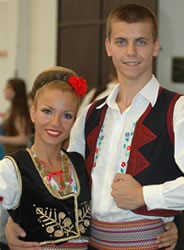Serb in Switzerland

Photo Source:
Anonymous
|
Send Joshua Project a map of this people group.
|
| People Name: | Serb |
| Country: | Switzerland |
| 10/40 Window: | No |
| Population: | 64,000 |
| World Population: | 7,933,800 |
| Primary Language: | Serbian |
| Primary Religion: | Christianity |
| Christian Adherents: | 80.00 % |
| Evangelicals: | 0.60 % |
| Scripture: | Complete Bible |
| Ministry Resources: | Yes |
| Jesus Film: | Yes |
| Audio Recordings: | Yes |
| People Cluster: | Slav, Southern |
| Affinity Bloc: | Eurasian Peoples |
| Progress Level: |
|
Introduction / History
The Serbs are a southern Slavic people who received strong cultural influence from the Ottoman Turks. They came from the coast of the Black Sea to the Balkans and north of the Danube River between Dniepar and the northeast Carpathian Mountains. Though their language is Slavic based, the 500 years they were controlled by the Turkish based Ottoman Empire gave their language a Turkish flavor. The Kingdom of Serbs, Croats and Slovenes was formed in 1918 and its name was changed to Yugoslavia in 1929.
The unraveling of Yugoslavia in the early 1990s resulted in the formation of the Independent Republics of Slovenia, Croatia and Macedonia in 1991. Bosnia-Hercegovina was formed in 1992, while Serbia and Montenegro remained as the new Federal Republic of Yugoslavia. Its leader, Slobodan Milosevic, tried to unite the neighboring republics into a "Greater Serbia," meaning other ethnic groups would be dominated by the Serbs. His effort failed, and Milosevic was ousted by his own people in October 2000. The two latter republics formed a loose union in 2002, called Serbia and Montenegro. Many Montenegrins regard themselves as Serbs, but others insist that Montenegrin is a separate ethnic identity.
Though most Serbs live in Serbia, there is a significant Serbian diaspora, especially in other European countries such as Switzerland. Though there were Serbs in Switzerland before the 1990s, that was the decade when all ethnic groups from former Yugoslavia left for Switzerland.
What Are Their Lives Like?
The Swiss tend to view all ethnic groups from former Yugoslavia as being the same. They arrived during a time when these ethnic groups were fighting one another. The crime rate of "former Yugoslavs" is very high today. For that reason, the Swiss have a low opinions of Serbs along with Croats, Albanians and Yugoslavia's Muslim population.
Serbs speak loudly when they are passionate about something. They believe that being soft spoken implies insecurity. Serbs tend to be blunt in their communication style and add dark humor to the conversation. Good eye contact is important if you want a Serb to trust you. They tend to stand close to those they know. These habits run counter to how the Swiss do things.
What Are Their Beliefs?
Most Serbs are either non-religious or they identity with the Serbian Orthodox Church. The Serbs converted from traditional Slavic beliefs in several waves between the seventh and ninth centuries. Some folkloric and traditional beliefs persist to this day, such as belief in fairies, witches and vampires. They offer food and drink to the dead on certain feast days.
Of all Slavic and Orthodox Christians, only Serbs have the custom of Slava. This is a celebration of the family patron saint, whom they believe protects them. A Slava is inherited from father to son, and each household may only have one. The Slava celebration involves bringing the family together for three days of celebration, ritual dishes, folk oratory and singing.
What Are Their Needs?
Serbians have their own Orthodox church, but most of them are disillusioned with religion. They need the chance to learn about the person, Jesus Christ, who is above religion.
Prayer Points
Pray that Serbs would seek a relationship with their savior, Jesus Christ.
Ask the Lord to help Serbian Christians and church planters to use holidays like Christmas to share the story of Jesus and his love for all nations.
Pray for a Holy Spirit empowered revival among Serbs all over the world.